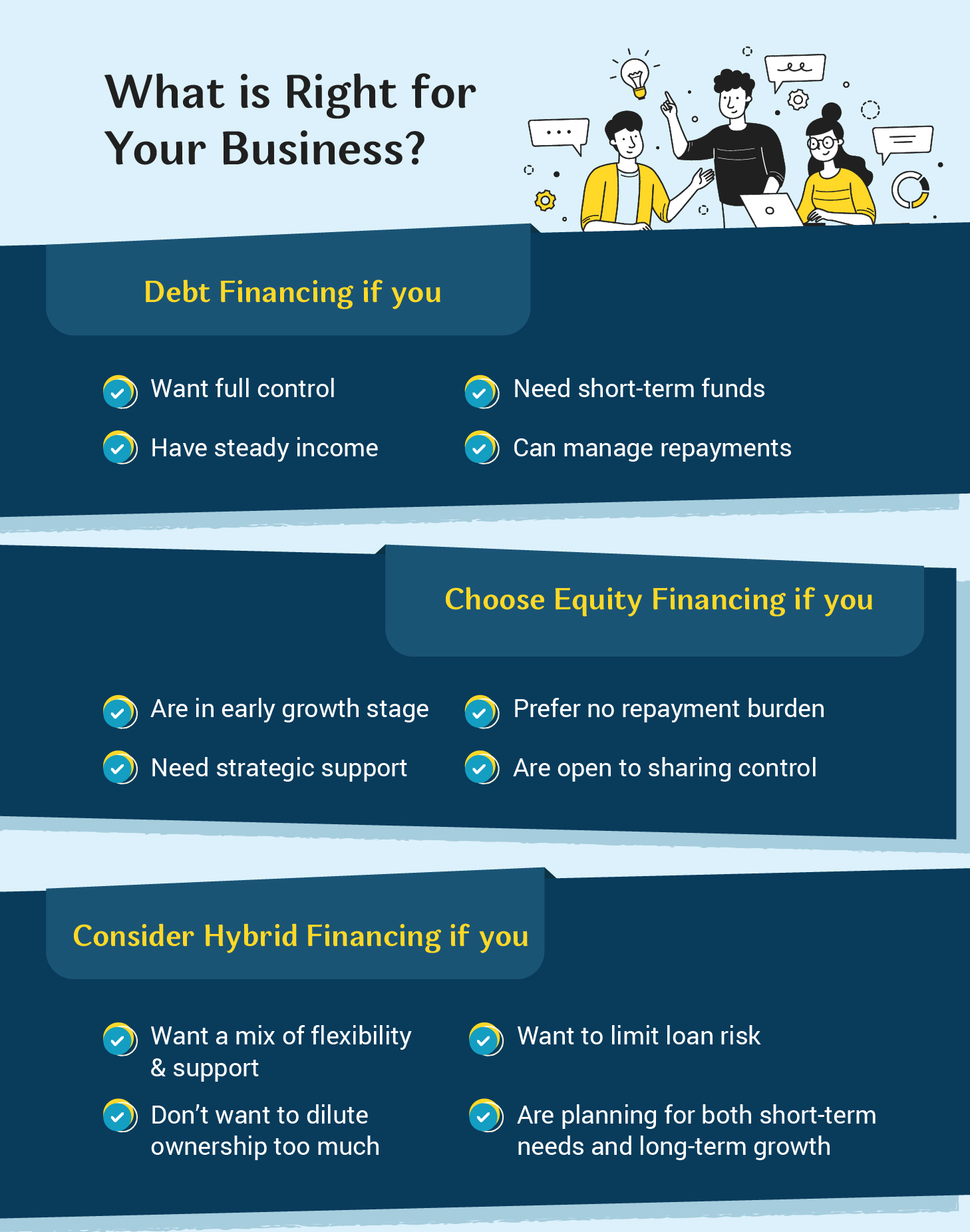Growing a small business often means spending more on opening a new branch, buying better machinery, hiring more people, or marketing. To manage the expenses for all the expansion activities, you may need funding if you are short on working capital or internal resources to support the growth. That’s when many business owners ask themselves: should I take a loan (debt financing) or bring in someone willing to invest (equity financing) in the business?
Debt allows you to retain full control of your business but requires regular repayments. Equity involves no repayment obligations, but you share ownership with investors. Both of these business funding options come with advantages and disadvantages. The right choice depends on your company's goals.
Here, we’ll explain debt vs equity financing to help you figure out what works best for your business.
Debt and equity financing: What do they mean?
Before we get into which business funding option is better, let’s first understand what debt and equity financing means.
Debt financing is when you borrow money from a bank, NBFC, or private lender and agree to pay it back over time with interest. It is like taking a business loan. You get the money up front, use it to grow your business, and then repay it in instalments, just like an EMI. Debt financing may or may not require collateral, depending on the type of loan you apply for: secured or unsecured. You must repay the money no matter what, even if sales are down.
Equity financing involves raising capital by selling ownership stakes in your business to investors. These investors can include venture capitalists, angel investors, private equity firms, or even friends and family. In return for their investment, they receive shares in the company, giving them partial ownership and a share in future profits. Unlike debt financing, there are no repayments or interest charges—but it does mean sharing control, as investors often seek a say in business decisions to protect and grow their investment.
Both financing options have their merits and demerits, and your choice depends on your business requirements.
Debt vs equity financing: Know the differences
When growing a business, choosing between debt and equity financing is crucial. Understanding the pros and cons of each option is essential for making an informed decision.
|
Factors |
Debt financing |
Equity financing |
|
Ownership |
You have full control of your business |
You share ownership with investors |
|
Repayment |
Must repay the loan with interest |
No repayments |
|
Control |
You make all the decisions |
Investors are also involved in decision-making |
|
Speed of funding |
Can be quicker if you qualify for a loan |
May take longer as finding the right investor takes time |
|
Cash flow impact |
Regular repayments can affect monthly cash flow |
No monthly repayment pressure |
|
Risk |
Higher risk because you’ll still need to repay even if the sales drop |
Less financial risk, but you give up some control and profits |
|
Support and guidance |
Limited to financial help |
Investors often bring mentorship, advice and business connections |
What’s right for you: Debt or equity financing?
When considering financing options for your business, it’s important to weigh the benefits and risks associated with both debt and equity. Each option comes with its own set of advantages and challenges, depending on your business needs and goals. Below are some points that will help you decide what’s right for you:

Go for debt financing, if:
- You want to keep full control over your business and decisions.
- You have a steady income or predictable cash flow to handle monthly repayments.
- Your business is established with a strong track record and you need a funding boost for growth.
- You are comfortable with the interest rate and are willing to manage debt temporarily.
- You’re looking for short-term financing with no long-term commitments to invest.
Go for equity financing, if:
- Your business is still growing or you’re in the early stages (Start Ups).
- You don’t want the pressure of monthly repayments.
- You’re open to sharing control.
- You’re looking for more than just money as investors can bring valuable advice, mentorship, and connections.
- You’re willing to give up a part of your profits to investors in exchange for their support.
Hybrid approach: The best of both worlds
Sometimes, the best solution isn’t choosing one side, it’s finding a balance. That’s where the hybrid approach comes in. This means using both debt and equity financing together. For example, you might take a small loan to cover immediate costs and raise some funds from investors to fuel long-term growth. This way, you can reduce your debt burden while still keeping most of the control and getting valuable support from investors.
Why consider a hybrid approach?
- It helps you manage risk better and you’re not too dependent on one funding method.
- You get cash flow flexibility from equity and ownership control from limited debt.
- It can be cost-effective, especially if you don’t want to give away too much equity or take on a large loan.
Think of it like picking what works best for your business. Every business is different, so your way of getting funds doesn’t have to follow just one rule.


















